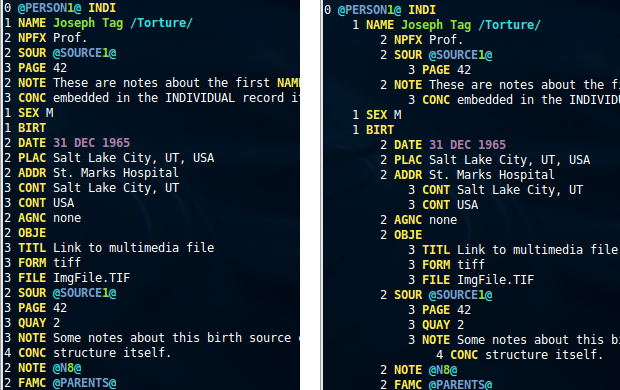Editing GEDCOM files with vim
GEDCOM files sometimes have no indentation. That makes it difficult to read or edit them with a text editor. Using the following simple instructions, you can auto-indent the file so that it is more readable in the vim editor.
Save the next few lines into a file called gedcom_indent. Make the file executable and place it somewhere in your path.
#!/usr/bin/env python
from __future__ import print_function
import sys
for line in sys.stdin:
line = line.lstrip()
try:
level = int(line.split(' ', 1)[0])
print('\t' * level, end='')
except:
pass
print(line, end='', sep='')
Now add the following 2 lines to your ~/.vimrc file:
autocmd BufReadPost,FileReadPost *.ged %!gedcom_indent autocmd FileType gedcom set foldmethod=indent nolist ts=4
This tells vim to filter any file with a “ged” extension through the small gedcom_indent filter (which will add leading tabs to the file). The second line tells it to make each TAB count for 4 spaces, and to fold based on indentation.

Here’s a Golang equivalent:
package main
import (
“bufio”
“io”
“log”
“fmt”
“os”
“strings”
“strconv”
)
func main() {
in := bufio.NewReader(os.Stdin)
for {
s, err := in.ReadString(‘\n’)
if err != nil {
// io.EOF is expected, anything else
// should be handled/reported
if err != io.EOF {
log.Fatal(err)
}
break
}
// Do something with the line of text
// in string variable s.
_ = s
//fmt.Print(“added: “+s)
trimmed := strings.TrimSpace(s);
level,err := strconv.Atoi(strings.Split(trimmed,” “)[0])
fmt.Print(strings.Repeat(“\t”,level))
fmt.Print(trimmed)
fmt.Print(“\n”)
}
}
@sridhar sarnobat
https://github.com/sarnobat/golang_tutorial/blob/master/3_gedcom/gedcom_indent.go